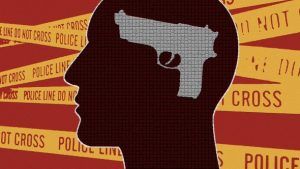Zachary Siegel in Undark:
 ON OCTOBER 2, 2018, police psychologist Laurence Miller took the stand to testify in the defense of Jason Van Dyke, a white police officer who shot Laquan McDonald, a black teenager from Chicago’s West Side, in 2014. The facts of the case didn’t look good for Van Dyke. A 13-year veteran of the Chicago Police Department, he had shot McDonald 16 times within seconds of exiting his squad car. Though McDonald was holding the knife he had reportedly used to damage a patrol vehicle, the 17-year-old was shot while walking away from cops in the middle of the street. None of these events were in dispute. The shooting had been captured by another police vehicle’s dashboard camera, and Van Dyke was charged with first-degree murder, 16 counts of aggravated battery with a firearm, and one count of official misconduct.
ON OCTOBER 2, 2018, police psychologist Laurence Miller took the stand to testify in the defense of Jason Van Dyke, a white police officer who shot Laquan McDonald, a black teenager from Chicago’s West Side, in 2014. The facts of the case didn’t look good for Van Dyke. A 13-year veteran of the Chicago Police Department, he had shot McDonald 16 times within seconds of exiting his squad car. Though McDonald was holding the knife he had reportedly used to damage a patrol vehicle, the 17-year-old was shot while walking away from cops in the middle of the street. None of these events were in dispute. The shooting had been captured by another police vehicle’s dashboard camera, and Van Dyke was charged with first-degree murder, 16 counts of aggravated battery with a firearm, and one count of official misconduct.
The 67-year-old Miller, who lives in Boca Raton, Florida, was not there to argue about external events. Instead, he asked jurors to focus on Van Dyke’s perception of the shooting. With the lights dimmed in the crowded courtroom, Miller presented a slideshow titled, “The Neuropsychology of Deadly Force Encounters.” In life-and-death situations, he explained, the body’s stress response can distort cognition, perception, and memory. For police officers, this can lead to a phenomenon he referred to as “deadly force mindset,” where the officer, flooded with neurotransmitters and hormones that ensure survival of the moment, feels his or her only option is to kill or be killed. Van Dyke, Miller argued, should be found not guilty of the charges against him. Jurors scribbled notes throughout Miller’s testimony.
The use of psychologists in courtrooms is nothing new, of course, and defense attorneys and prosecutors alike have long relied on expert testimony to help divine the complex soup of chemical hormones and electrical impulses that drive human behavior. But the use of psychology in the defense of police officer shootings is less common — in part because so few officers ever end up on trial.
More here.
